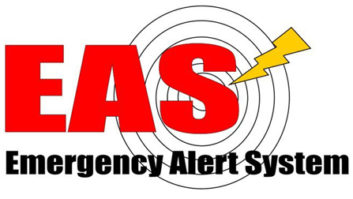The FCC is taking steps to improve emergency alerting in the United States just as Hurricane Ian races across Florida and is poised to bring potentially flooding rains to Georgia and South Carolina.
The changes adopted Thursday, Sept. 29 at the commission’s monthly meeting are meant to make the alerts from broadcasters more informative and easier to understand by the public, particularly people with disabilities, the FCC said.
The updated rules will replace the technical jargon that accompanies certain alerts — including test messages — with plain language terms, but the changes will affect radio broadcasters in other ways. New rules also will require broadcasters, cable systems and other Emergency Alert System (EAS) participants to transmit the Internet-based version of alerts to the public when available, rather than transmit the legacy version of alerts.
The increased use of Internet-based alerts, in Common Alerting Protocol (CAP) format will produce higher-quality audio messages, improve the availability of multilingual alerts and ensure that more of the alerts displayed on television screens contain all of the information provided by the government, the FCC said in today’s order.
The FCC acknowledges that CAP polling and prioritizing CAP messages could require some broadcasters to download updates for their EAS decoders. For that reason the commission adopted a consolidated compliance schedule allowing a full year from the effective date of the order for radio entities to comply with all regulatory changes. The FCC says it doesn’t expect those costs tied to updating station EAS equipment to be prohibitive.
[Sign Up for Radio World’s SmartBrief Newsletter]
“The cost of the software changes needed due to the requirements adopted today will not significantly exceed the costs of software updates that most EAS participants would need to implement whether or not these rule changes are adopted,” the FCC noted in the order.
A statement from FCC Chairwoman Jessica Rosenworcel included the following: “Climate change is making storms more frequent, more dangerous, and more damaging. We need to respond in kind. That’s because keeping communications networks up and running can save lives. Ensuring they deliver the right emergency information to people at the right time can keep communities safe. So today we update our Emergency Alert System to make sure the messages it provides are clear for everyone.”
The FCC has previously pointed to the seeming increase of natural disasters in this country when seeking ways to improve EAS. Rosenworcel noted Thursday how Hurricane Fiona heavily damaged Puerto Rico just last week.
The FCC concluded the EAS Report and Order: “As a result of today’s action by the commission, people who are deaf or hard of hearing will have access to alerts in a viewable format that more closely matches the audible versions of these alert messages on television.
“In addition, people who are blind or visually impaired will have access on their radios to national alerts containing more detailed audio information. Clearer and more accessible alerts will help all Americans prepare for and respond to emergencies.”






